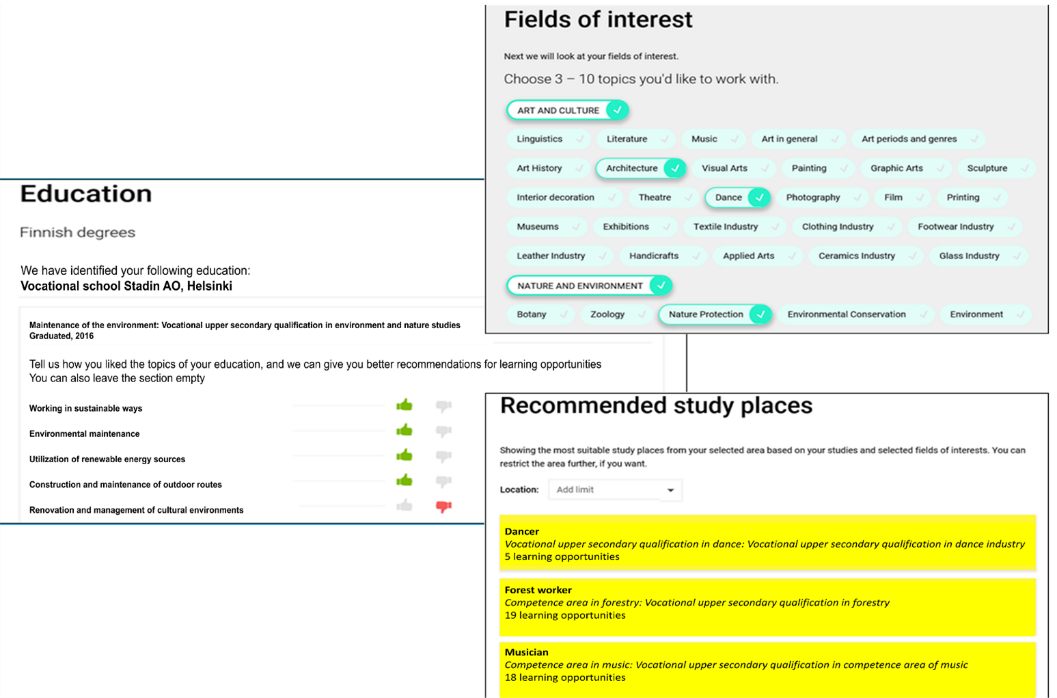March 13, 2024
Keywords: Learning Analytics, Artificial Intelligence, Guidance, Decision-Making, Educational Transitions
Target readers: learning analytics practitioners, researchers, academic advisors, guidance counselors
Author: Egle Gedrimiene
 Egle Gedrimiene is a doctoral candidate at the Faculty of Education and Psychology, University of Oulu, Finland. She is currently finalizing her dissertation about use of learning analytics for lifelong guidance support.
Egle Gedrimiene is a doctoral candidate at the Faculty of Education and Psychology, University of Oulu, Finland. She is currently finalizing her dissertation about use of learning analytics for lifelong guidance support.
LinkedIn: linkedin.com/in/egle-gedrimiene-334ab2182

Photo by bruce mars on Unsplash
BIG EDUCATIONAL DECISION COMING? HERE IS HOW TECHNOLOGY CAN HELP
Did you ever find yourself wondering about your educational choices? Where to study? What major to choose? What career path to take? Or have you ever regretted your educational choices, dreamed of changing your career and wished to embark on a new learning journey?
At some point in our lives, we all must find answers to important educational and occupational questions. Indeed, educational choices are among the most important ones in life. After all, they often require long-term commitment, are hard to undo and can dramatically change the direction of our lives. So, could they be facilitated and could emerging technology provide support in such situations?
In our recent study we explored how a data driven LA/AI tool supports people facing educational transitions and decisions. Specifically, we investigated users’ experiences with a recommendation system that suggested study programs based on unique user data. Many readers might be familiar with recommendation systems through online commercial and entertainment services, but they can similarly be used for recommending learning content. In our study, the recommendation system was a proof-of-concept tool that suggested study programs in vocational education and training institutions and applied universities in Finland. The users were asked to indicate their interest, as well as likes and dislikes from the selected educational background possibilities. Finally, the tool provided the users with ten educational options that were calculated as the best matches for unique user preferences. Screenshots of the tool in Figure 1. (Check the related article if you are interested in more details).

Fig. 1. User view screenshots of the LA tool for guidance (Gedrimiene et al., 2023)
The users in our study were real clients of career guidance services who needed guidance on their future education options and agreed to try out the piloted recommendation tool. Most of them were young people from vocational education and training institutions. We were interested in finding out how the users felt supported by the pilot tool in the face of educational transitions and how their career decision-making process was facilitated.
Can an LA/AI tool help make better educational choices?
The theory states that, in order to make good career choices, we should know ourselves, have some reliable information about education and work, explore several alternatives and finally narrow down to a couple of most appealing options. Knowing this, we wanted to examine how the tested tool succeeded to support the users in the career decision-making process. What we found was that majority of the support from the tool focused on final decision-making steps – in-depth analysis and choice between a small number of options. The support for initial decision-making steps fell short. This indicated that the LA/AI recommendation tool might be more useful for individuals who already have a wider understanding about the world of work, know themselves rather well and prefer to focus on exploring a couple of interesting options. On the contrary, for those who are at the start of their exploration, the piloted tool provided too few possibilities for self-reflection and contextual career information.
How can the LA/AI tool support learners facing educational decisions and transitions?
We found five main categories of support were important to the users in this specific context. The users of the AI/LA tool for guidance appreciated quality information about education possibilities and the possibility to interact with and explore that information in different ways. They also emphasized the importance of the tool broadening their perspectives on educational alternatives, the possibility to better understand their own interest and competencies and to feel more secure and confident about their educational choices. Although many of the users stated they were supported, further development of the tool was needed especially for diversification of ideas on educational opportunities and self-reflection.
When do people intend to use LA/AI guidance tools?
Finally, we also asked about the life circumstances in which users intended to utilize the LA/AI tool in the future. The answers ranged from educational and work-related situations, such as dropping out of studies, unemployment, and considering different or further education options. The common features were the need to choose between certain educational or occupational options, uncertainty and the users not knowing how to proceed with their education and careers.
Practical implications and the take-home message
Developers might consider the results of this study when developing LA/AI tools for guidance. E.g., they could further focus their design efforts on one or several supportive roles described by the users.
Guidance practitioners might also be interested in the findings of this study as they can help them better evaluate the suitability of the recommendation tool for guidance practices. E.g., students/clients who already have a good understanding of their interest and preferences might be those who could utilize the LA/AI tool with more gains.
Finally, the take-home message from this study is that users regard LA/AI as a supportive asset in the face of educational transitions and decisions. Individuals intend to rely on this support in the circumstances of uncertainty and change. This suggests that potential users trust data-driven guidance and may therefore be vulnerable to its’ influence. Developers and guidance practitioners should take responsibility in this context, understanding that trust or even over-reliance on the provided guidance is possible.
This blog entry is based in the following article:
Gedrimiene, E., Celik, I., Kaasila, A., Mäkitalo, K., Muukkonen, H. (2024). Artificial Intelligence (AI)-enhanced learning analytics (LA) for supporting Career decisions: advantages and challenges from user perspective. Education and Information Technologies 29, 297–322. https://doi.org/10.1007/s10639-023-12277-4
Other utilized references:
Gedrimiene, E., Celik, I., Mäkitalo, K., & Muukkonen, H. (2023). Transparency and trustworthiness in user intentions to follow career recommendations from a learning analytics tool. Journal of Learning Analytics, 10(1), 54–70. https://doi.org/10.18608/jla.2023.7791
Gutierrez, F., Seipp, K., Ochoa, X., Chiluiza, K., De Laet, T., & Verbert, K. (2020). LADA: A learning analytics dashboard for academic advising. Computers in Human Behavior, 107, 105826. https://doi.org/10.1016/j.chb.2018.12.004
Poquet, O., Kitto, K., Jovanovic, J., Dawson, Sh., Siemens, G., & Markauskaite, L. (2021). Transitions through lifelong learning: Implications for learning analytics. Computers and Education: Artificial Intelligence, 100039. https://doi.org/10.1016/j.caeai.2021.100039
Sullivan, E. Sh., & Al Ariss, A. (2019). Making sense of different perspectives on career transitions: A review and agenda for future research. Human Resource Management Review, 100727. https://doi.org/10.1016/j.hrmr.2019.100727
